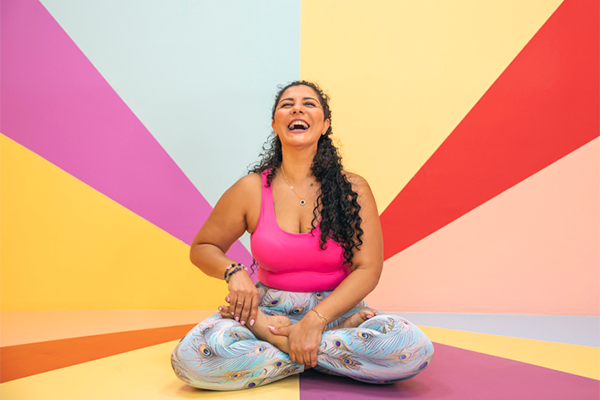“Body Neutrality” Can Boost Your Motivation — Here’s How

Exercise is a key element in many weight loss plans. After all, research suggests that a combo of healthy eating and exercise is more effective than diet alone.
But if you feel like you’re getting too caught up in the number on the scale or societal standards of size, it can be helpful to focus on all the other amazing reasons to exercise — not just weight loss.
The body neutrality movement might be just what you need to recalibrate your motivation.
What Is Body Neutrality?

Body neutrality is like calling a truce with your body, says Adrien Paczosa, RD, LD, CEDRD-S, a registered and licensed dietitian in Austin, TX.
Think of it as a stepping stone between negative self-talk (which can discourage you from going after your goals) and full-on body positivity (which you may still be working on).
Being body neutral is about focusing on what your body can do, not what it looks like. When you’re tempted to skip a workout, you may find that body neutral reasons to exercise — like conquering a fitness challenge or enjoying a walk outdoors — are more powerful motivators than just focusing on weight loss.
How Can I Be Body Neutral?
Want to start your journey towards body neutrality? Instead of focusing on what you love or hate about your body, ask yourself what you simply appreciate.
For example, you might be grateful for your ability to walk. Or your hands might remind you of your grandmother’s. This can help you “bridge the path to body neutral,” Paczosa says.
And when you need motivation to exercise or eat healthy, focus on how it will improve your overall health. “Your body is a complex machine that has a lot of needs,” says Ryan Parzick, CPT, trainer at Fuerte Fitness. “I believe that exercising and eating should be with the goal of making your body function properly.”
7 Body Neutral Reasons to Exercise
While exercise is often touted as one of the keys to weight loss, there are so many other great reasons to move our bodies. “Movement is the key to your body’s happiness,” Parzick says.
Here are some of the best body neutral reasons to exercise.
1. To boost your mood

When you exercise, your body releases endorphins. These feel-good chemicals can help to improve your mood and increase your sense of wellbeing.
If your workout includes steady-state cardio or high-intensity intervals, you may even experience a feeling of euphoria known as “runner’s high” — though not everyone experiences this, and “it doesn’t mean you’re broken if you don’t,” Paczosa says.
2. To benefit your mental health
Exercise is one of the best stress management techniques. Not only can exercise help to reduce levels of the stress hormones cortisol and adrenaline, but research suggests regular aerobic exercise may also help to reduce anxiety and depression symptoms.
“We can’t exercise our way out of depression, but it can be a tool along with other supportive treatments,” Paczosa says.
Not in the mood for a full sweat session? A calming meditation practice can also help combat stress.
3. To build strength
If you need a more specific goal than “lose weight,” consider setting a strength goal for yourself — like holding a plank for two minutes, or being able to do five unassisted pull-ups.
“Strength training isn’t just for muscles — it’s also for your bones and ligaments, and for flexibility and range of motion,” Parzick says. After all, we’ve only got one body, and it needs to last us throughout our entire life.
4. To sleep better

If you struggle to get a good night’s sleep, exercise can improve your sleep quality. Research suggests regular exercise may lessen insomnia and increase the amount of restorative deep sleep you get.
“When you are able to exercise, it really can help with sleep because you’re using muscles, using energy, using fuel,” Paczosa says.
Just keep in mind that the release of feel-good endorphins after a workout can make it harder to fall asleep, so you may want to avoid strenuous exercise within two hours of bedtime.
5. To support your heart health
It’s no secret that exercise gets your heart pumping — and that may help to improve blood pressure and vascular function. The American Heart Association recommends getting at least 150 minutes of moderate-intensity aerobic activity (or 75 minutes of vigorous aerobic activity) each week to maintain your overall health.
6. To have fun
Exercise shouldn’t feel like punishment! When you find a workout you actually enjoy — whether it’s barre or power walks or Pilates — you’ll be more motivated to show up. “Do things that bring you joy,” Paczosa says. “If you don’t like to run, don’t run.”
7. To connect with others

Taking a virtual fitness class can be a way to build a community and socialize, even when you’re social distancing. You can also enlist someone from your household or “quaran-team” to be your workout buddy.
8. To celebrate what your body can do
Instead of worrying about what you want to change about your body, focus on what you can do right now. “Body neutrality gives you that space to not make your body the enemy,” says Paczosa.
If you held a tricky yoga pose, or shaved a few seconds off your walking pace, that feeling of accomplishment can be a great body neutral reason to work out.
